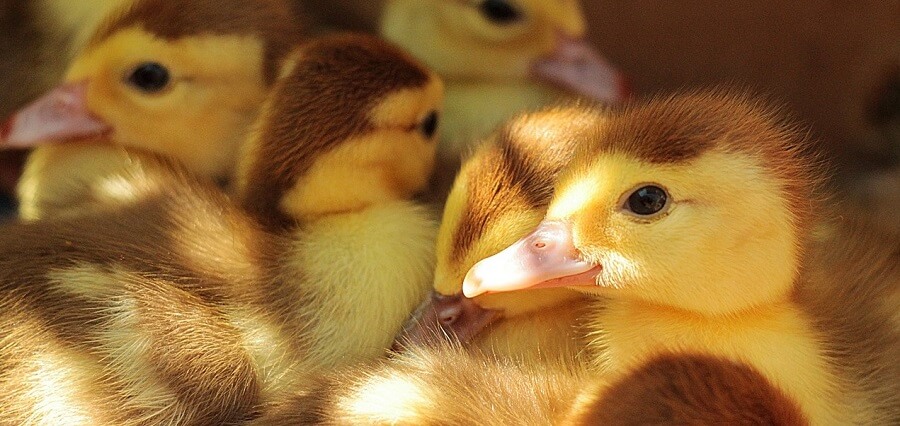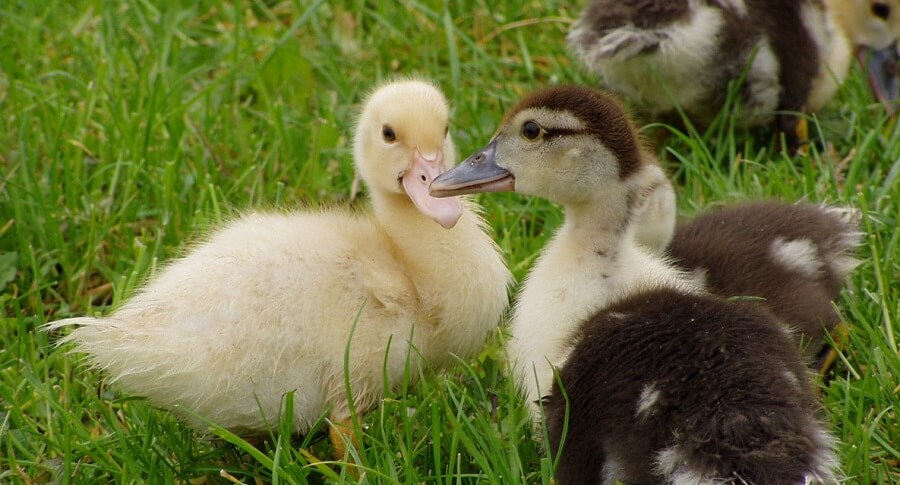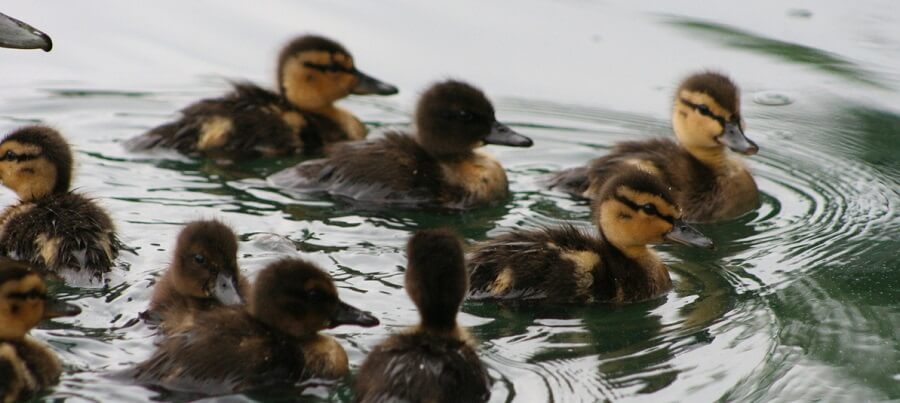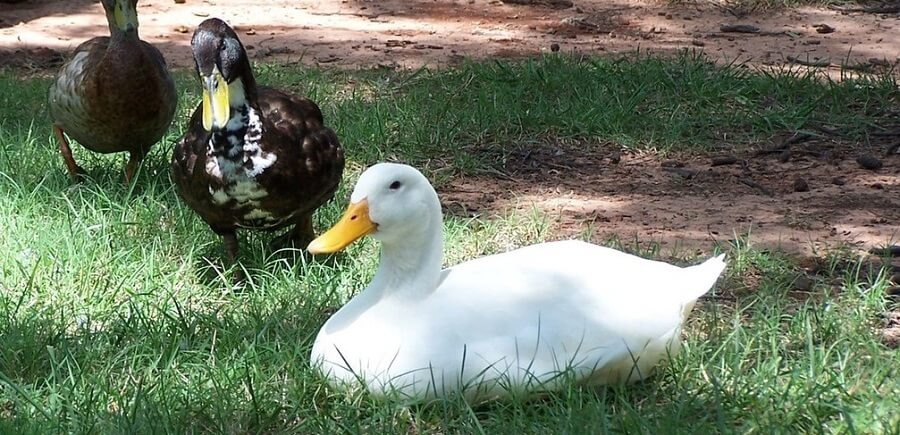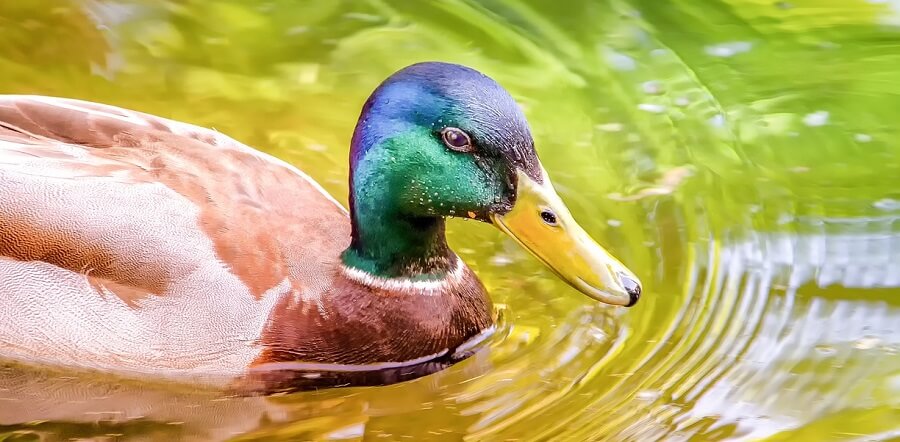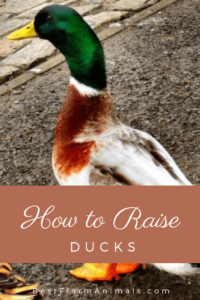When I first decided to raise ducks, I kept getting more questions than answers. “Are you raising them for eggs or meat?” and “What breed of ducks are you raising?” are just a few of the questions I got. Initially, I just wanted ducks because they are cute and fun to watch. But, I soon learned there was so much more to ducks than I gave them credit for.
Are you thinking about raising ducks? Although they may seem similar, ducks are different than chickens and they have different needs. Ducks also come with a completely new set of benefits and challenges. In this article, we will explore what you need to raise healthy ducks, how to choose your breed, and answer common concerns about ducks.
How To Raise Healthy, Friendly Ducks
Anyone who has visited a city park knows how friendly ducks can become when they get used to people. Ducks are fun, mellow birds that can also provide a slew of benefits to their owners. They are often considered the easiest and healthiest bird to raise.
1. Hatch Ducks Or Raise Them Young To Tame Them Easily
Ducks can easily become attached to their owners and follow them around constantly. But, it doesn’t always happen.
Why?
Ducks are different in personality than chickens. Ducks are very social birds and the entire flock of ducks will usually act like one. Ducks can devote the whole of their loyalty to each other.
One of the most important thing that you can do when raising ducks is to try and raise them as young as possible. Ducks can easily recognize your voice and realize that you bring good things to them.
The younger they are, the easier it is for them to bond. Dave Holderread, in Storey’s Guide to Raising Ducks, tells of an experience he had where he talked to incubating ducks. Upon hatching those ducks all flocked to him, despite being called by other people. They recognized his voice above other human voices.
Even when you can’t raise ducklings from the egg stage, you can still bond with them. Try to purchase young ducklings that are newly hatched. Most hatcheries will ship ducklings out on the day that they hatch. If you purchase from an animal supply store, then go pick up your ducks on the day they are stocked.
This helps your ducks to become acquainted with you as early in their lives as possible. Older ducklings can resist bonding because they spent the earliest parts of their lives without human interaction.
- Raise ducklings as young as possible to increase their attachment to you
2. Provide A Warm Brooder
Ducklings need a warm place. They don’t grow their feathers until about four weeks. Their oil gland doesn’t start producing the oil for waterproofing until later. As a result, ducklings are very susceptible to getting cold and wet. (Not as susceptible as chicks though)
You need to provide a warm brooder, a good water source, and clean bedding to keep ducklings healthy.
The Brooding Container
The brooder doesn’t have to be expensive. It can be as simple as a large Tupperware storage bin. They are easy to clean and will store well when you aren’t brooding ducklings.
Ducks can be very messy, especially with the water they need. You can check out my favorite brooder supplies on the recommended products page.
Keeping Ducklings Warm
Ducklings need to have a brooding box of about 90-95 degrees when they are young. As their feathers fill in, they need less heat.
The two best ways to heat ducks is either with a safe heat lamp or a ceramic heater. Each week, lower the heat by about 10 degrees. You can do this by raising the heat lamp away from the brooding box. Ratchets make this easier than tied rope.
Ducklings can be overheated. They will show that they are too hot by congregating at the corners and edges of your box away from the heat source. They will also pant from heat.
Duckling Bedding: Ducklings need coarser bedding than chickens. They will often mix it with their food and it can cause choking hazards for them. Use straw, wood chips, or pelleted bedding. It will usually need to be changed out at least daily unless you take extra precautions to keep bedding warm (See cleanliness below). Moldy bedding can cause ill ducks.
- Use a plastic bin for a brooder and have easier cleaning
- Paint train and rack helps to keep the bedding dry and clean
- Food trays help with water use and keep ducks clean
- A heat source that is adjustable to keep ducks warm, but not overheated
- Propper bedding to keep ducks warm
3. Define Duck Destiny
At the beginning of raising ducks, you will want to define the purpose of your ducks. That’s because meat ducks will be a lot harder to butcher if you’ve grown attached to them. You won’t want to spend as much time taming meat ducks as you will with egg ducks or pet ducks.
If you are raising both meat and egg-laying ducks, then you may want to separate out the ducklings into separate bins. That allows you to spend more time talking and bonding with your egg-laying ducks. It also makes it easier for children to focus their bonding time with ducks that will be around for a while.
- Identify your egg-laying ducks and drakes
- Identify which ducks are destined to be meat ducks
- Don’t form strong bonds with your meat ducks
4. Ducks Need Water
Ducks have a critical relationship with water. They need it to eat their food and they need it to keep their bills, mucous membranes, and feathers clean. They need water to keep their eyes moist. When fully grown, they need it to help activate the oil glands that keep them waterproof.
From the first day that you have your ducklings, you need to provide water to them. They will drink a lot of water. Check their water levels 3 or 4 times a day. Without water, ducklings won’t be able to wash down food. You can feed them moist food to assist in this, but they still need a water source.
In addition to using water to swallow their food, ducks also need water to wash their heads.
Water washes out their mucous membranes, mouth, and nose. It keeps them from getting parasites and helps them to stay healthy. Ducks who don’t have access to enough water to submerge their heads will quickly become unhealthy ducks. That means you need to provide deep enough water for submerging their heads.
But, don’t provide pools of water for ducklings. They don’t know how to swim well yet and are at risk of drowning. Plus, since they aren’t wild ducks, they don’t have mothers to coat their skins with waterproofing oil. This means that they can chill if completely wet.
If you allow your ducklings to go swimming, make sure that you monitor them for distress. Towel dry them off when they are finished.
- Ducks need a lot of drinking water
- Ducks need to submerge their heads for cleanliness
At about 4 weeks your ducklings will start to produce oil in their oil gland. At 5-6 weeks old, ducks can start to play in the water without as much constant supervision. At this point, they start growing their feathers and becoming more waterproof.
By the time they are fully grown, your ducklings will have a producing oil gland at the base of their tail. This oil gland is activated when water splashes on it. It also makes them resilient to wet and cold weather.
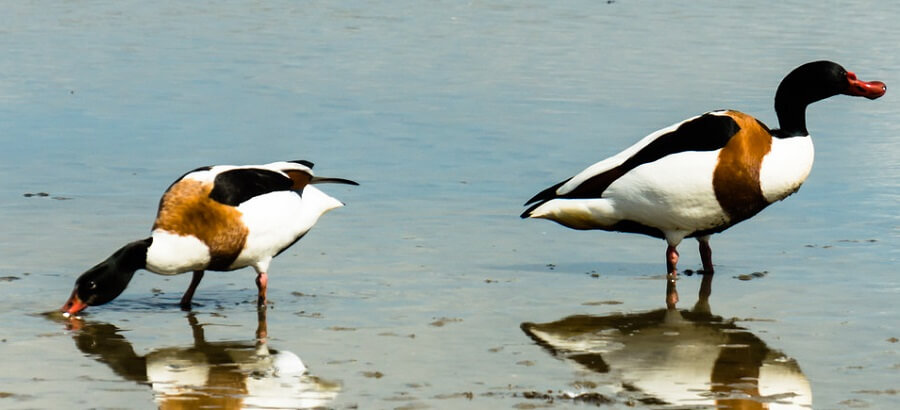
Providing Bathing And Cleaning To Adult Ducks
Adult ducks love to play in the water, but they don’t need a pond. You can provide for the bathing needs of adult ducks through a kiddie pool.
If you don’t want to provide a place for your ducks to swim, make sure that you still provide enough water for your ducks. You will also need to check the water often to make sure it is clean and filled.
If you provide a pool or other swimming place for your ducks, make sure to keep it safe from kids. Young children can drown in as little water as 1 inch deep. So keep it fenced off.
Keeping Water For Ducks Below Freezing
Ducks need unfrozen water in the winter to fight illness.
Their water doesn’t have to be warm, it can be lukewarm or even cold. You can keep water containers from freezing over by using an electric water warmer or by changing the water regularly enough that it doesn’t have time to freeze.
5. Healthy Food For Ducks
Ducks need the right food to eat and they need water to eat and swallow food or they risk choking. Often ducks will bring their food to the water to swish around. You will want to provide a constant supply of food for your ducklings. It can be reduced to twice-daily feedings once they are grown.
Can I Feed My Ducks Chicken Feed? Ducks can be fed a chicken feed, but it cannot be medicated because they eat more than chickens and will overdose. Plus, ducks have different nutritional needs. They need less protein, more niacin, and more vitamin B.
Make sure that your ducks don’t eat chicken feed with more than 20% protein for the first two weeks. After thank, their protein should be reduced to less than 18% concentration. When ducks start laying eggs, keep their protein to about 16% of their feed.
- Limit hatchling protein to 20% of diet the first 2 weeks
- Limit duckling protein to no more than 18% of their diet
- Limit laying ducks to 16% of protein
If you do feed chicken feed to your ducks take these steps to make sure it is healthy for them.
- Dilute protein content with oats or other grains.
- Add brewers yeast to duck feed at a 2% ratio or sprinkled on. This helps to prevent angel wing in ducks by providing essential nutrients, including niacin.
- Feed ducks with pellets and not poultry powder, which is more likely to choke ducks.
Duck food will be more nutritionally suited to ducks than chicken feed.
Other Food Sources For Ducks
You can almost think of ducks as pickier pigs- a ready appetite for all sorts of table scraps. Ducks will eat many things including most fruits and vegetables.
- Corn, peas, tomatoes and other veggies
- Leafy greens (They won’t eat wilted greens)
- Watermelons, cucumbers, melon, apple cores
- Eggs
- Birdseed, chopped nuts, and sunflower seeds
- Layered pellets
- Insects, slugs, frogs, and worms. Bugs are excellent foragers!
Can ducks eat sunflower seeds? Ducks can eat shelled and nonshelled sunflower seeds. Unlike chickens, they don’t need the seeds to be shelled. But, unsalted sunflower seeds should be fed to ducks as the salt is bad for them and can make them sick.
Make sure that large food is chopped up because your ducks don’t have teeth! They also need access to dirt, sand, grit, or other course substances to help them break up the food.
What Not To Feed Ducks
There are lots of foods that you should not give your ducks at all or should limit the quantities given.
Never feed ducks:
- Citrus fruit: Never give – it causes stomach pain and acid reflux
- Avocados – poisonous to ducks
- Raw potatoes and raw beans – dangerous
- Salt- Can kill ducks
Foods that you should limit the quantities for ducks:
- White bread: It’s nutritionally void and only provides empty calories
- Spinach: It prevents the absorption of calcium and hurts with egg-laying
- Fish: It can taint the taste of duck eggs
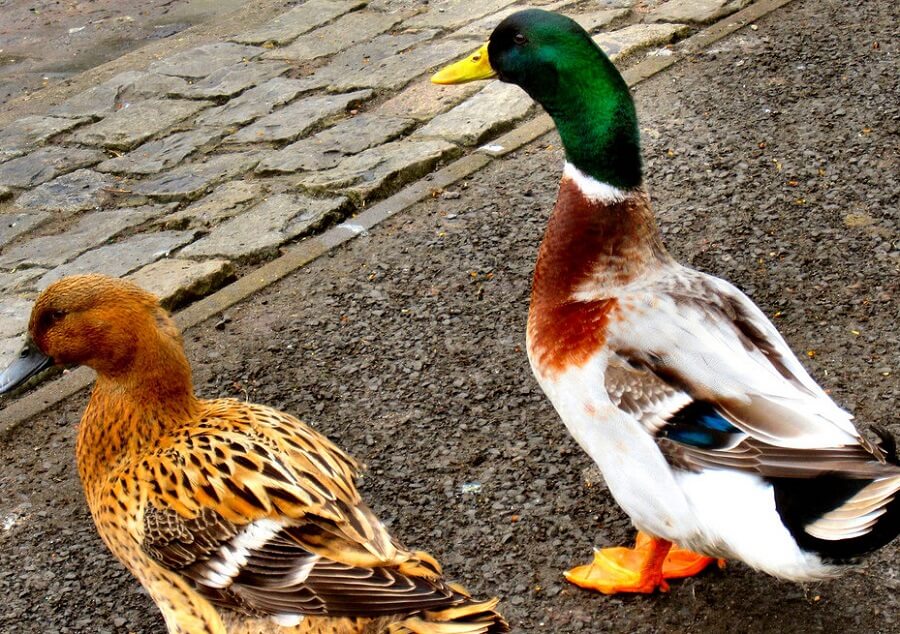
How Often Should I Feed My Ducks?
Ducks can be provided with on-demand food that is constantly available to them. They also grow well under a twice a day feeding. There are benefits to both methods of feeding.
Providing ducks with constant food allows them to decide how much additional food they need. But it can also attract rodents who want a free food source.
Feeding ducks twice a day encourages them to forage for insects during the day but takes more time from you as their caregiver. Regular feedings should be consumed within about 15 minutes if it’s the right amount of food.
Ducks Need Grit
Ducks need chicken grit, sand, or coarse dirt to help them digest their food. They don’t have teeth and so having coarse dirt helps them to break up what they are eating.
6. Keep Ducks Clean
Ducks are usually very messy because of their love for the water. If given the chance, ducks will coat nearly everything in water, including their bedding and food. This can lead to mold and the spreading of bacteria.
Additionally, even healthy ticks can transmit E Coli. This makes it important to keep duck waste away from their food. There are several things you can do to reduce the mess caused by your ducks.
Keeping Duck Water Clean
You can keep the duck’s water clean by placing the containers over a wire mesh that is raised a few inches above the ground. This will allow the water to collect below the ducks and will eliminate much of the mud that ducks usually create.
Do this with ducklings by using a paint tray with a roller mesh on top. Use feeder trays for the water so the ducks can’t hop into the water.
You can also provide their watering outside of their pen fencing and force them to reach their necks through the fence to wash their heads. However, I would hesitate to use this method because a hole large enough for your ducks to reach out is also large enough for many predators to get into killing your ducks.
Even with added measures, duck drinking water will need to be rinsed out and cleaned regularly. You can rinse their drinking dishes with vinegar to help kill bacteria.
- Ducks need enough water to submerge their heads
- Use wire mesh to help minimize mud ponds
- Clean water regularly
7. Ducks Need Other Ducks And Can Bond To Humans
Ducks are very social creatures. That’s why you almost never see a lone duck. Never raise a single duck. It will be lonely and unhappy. Raise at least two ducks together.
In addition, ducks can bond very well to their human masters. You can increase bonding with your ducks by spending time with them. Getting to know them as early in their life as possible will also help with duck bonding.
You can hand-feed ducks treats and hand-feed them regularly. This trains them that you bring good things for them. Additionally, try getting down on their level with them. It can be less intimidating to them and help them to feel less defensive. Because drakes are not as aggressive as roosters, getting low doesn’t add any risk to your safety.
- Spend time with ducks
- Hand-feed ducks
- Get down on their level so you aren’t as intimidating
8. Ducks Need A Safe House
Duck houses serve three purposes. It provides shelter from the weather, a place to lay eggs, and protection from predators.
But,
Ducks aren’t as particular about their house as chickens. Ducks like a drafty house with good ventilation. They don’t mind leaks when it rains and they don’t get cold or chilled easily. Because ducks like water, a sealed house, is more likely to get moldy and have mildew. A drafty duck house will allow water to dry easier and will keep the house cleaner.
Duck floors can be raised off the ground to allow for water to drain, but ducks will need a ramp to walk up the duck house.
Be aware!
Ducks have many predators and those predators can sneak into the duck house through gaps and holes. Therefore, you should cover holes and vents with ½ inch hardware cloth to keep predators out.
Locking ducks in their house will help to keep them safe from predators. Most ducks will flock together and will follow you into the duck house.
Yet, ducks don’t need to be locked in at night. They love to sleep under the stars. You can also provide them a duck house with an open door and a safe pen at night. The pen should be enclosed to keep predators away.
Fencing should be no more than ½ inches wide. Additionally, the fencing should be burning at least 6-12 inches deep to keep other animals from digging under the fence. A top netting above the night run will keep climbing predators like weasels and raccoons from climbing over the fencing.
Duck houses can be made of pallets, dog houses, leftover wood or whatever you have lying around. Make sure to provide plenty of hay, sand or wood chips on the floor. Ducks won’t perch and will nest on the ground at night. If you are only keeping your ducks locked up at night, then they will need about 3-5 feet of space per duck. If you keep them constantly locked up, then ducks need about 10 feet of space per duck.
How To Raise Ducks For Eggs
If you choose to raise ducks for their eggs, then there are several things that you need to provide for your ducks. You will also want to decide if you want to raise any ducklings from your eggs and if so, you will need at least one drake.
- Have at least 2 ducks per 1 drake.
Drake’s can actually mate a duck to death. Instead, make sure to have at least 3 or 4 ducks per drake. Drakes can handle as many as 12 ducks at a time.
- Keep ducks locked up until mid-morning to make egg gathering easier
Ducks will start laying at about 5 or 6 months. They are early layers and will lay just before sunrise. They can lay as early as 4:30 am and most breeds will be done before 6 in the morning. Keep ducks locked up until 9 or 10 to prevent them from hiding the eggs.
Plus, laying ducks will also lay better if they are locked in at night. This makes them less likely to scare.
- Provide the right diet for egg-laying with calcium and protein
Laying ducks need about 16% protein in their diets. They also need adequate calcium. This can be offered to ducks on a free basis so they can eat it as needed.
- Extend the daylight and maintain consistent laying
Unlike chickens, ducks will lay during very cold winter months as long as they have enough light hours. Ducks need about 13-16 hours of daylight to keep laying eggs. You can provide light to ducks with a simple 24-watt bulb in their duck house.
But,
Make sure to not give ducks light all night and keep their light consistent. If lighting changes or diminishes, then laying can cease suddenly. Instead, use an automatic timer to keep the lights coming on before daylight and turning off a few hours after nightfall.
Ducks that get too much light are more likely to molt prematurely and are more likely to become broody. Broody ducks will stop laying eggs.
- Keep feed consistent
Never change feed wild ducks are laying. This can disrupt their egg-laying. If you must change their food, do it gradually over a couple of months. You should also make sure to keep your layers fed enough. This will help to keep them laying strong and is especially important during the winter months when they can’t forage as well. They also need a constant supply of clean water.
Don’t feed laying ducks cottonseed meal because it causes strange coloring in the eggs.
- Brooding boxes aren’t required
Nesting boxes aren’t necessary, but it helps with convenience. Ducks may still choose to lay wherever they want. Some ducks will hide their eggs. Brooding boxes should be 16’ square. You can also lay extra hay in the corners of their hen house for laying eggs.
Ducks will usually lay for up to five years. This makes them much more productive than chickens who usually only lay for a couple of years.
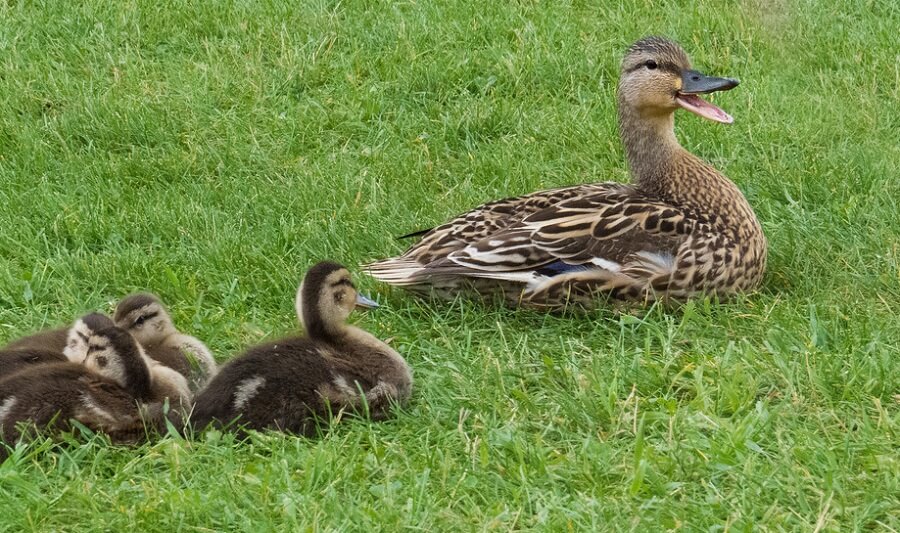
Raising Ducks For Meat
Raising ducks for meat is fairly simple. Ducks can be butchered at specific ages to help with the plucking of feathers. Once the juvenile feathers are done and the adult feathers start to come in, plucking becomes easier.
At 8 weeks, the ducks will be full-grown, but won’t have filled out meat-wise. But, at that time, the meat is still tender and lean and the ducks have gained good weight.
It takes about 3 months for most ducks to completely fill out to adult-weight. So depending on if you want more meat, easier plucking or increased tenderness you will want to butcher your ducks at different times.
- 8 weeks: great time for plucking
- 12 weeks: ducks reach full meat size
- 12.5 and 18 weeks: other good times for plucking with larger weight gains
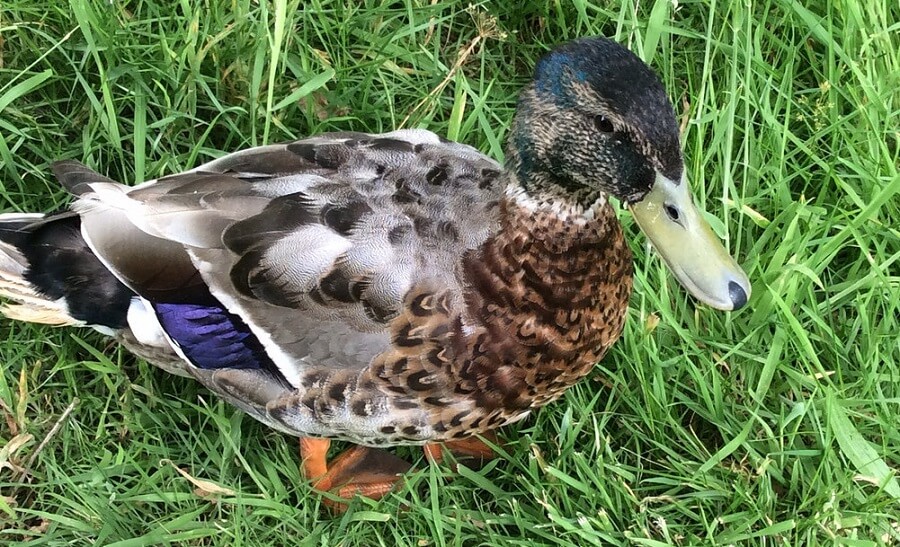
Related Questions
Is Duck Meat Better Than Chicken Meat?
Many people prefer duck meat. In the USA, chicken is still more widely well-known than duck meet.
But, duck meat is considered healthier.
It is leaner than chicken. It has about ¼ the fat content than chicken. It is more expensive in the store than chicken.
Are Ducks Eggs Healthier Than Chicken Eggs?
Duck eggs have more nutrients and vitamins than chicken eggs. They also have a higher level of iron and Omega-3. Duck eggs do have higher cholesterol, but its the good kind. They also have a higher fat content. Overall, duck eggs are considered more healthy than chicken eggs.
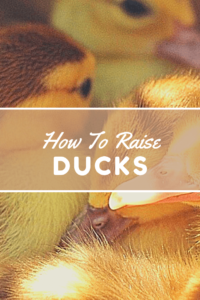

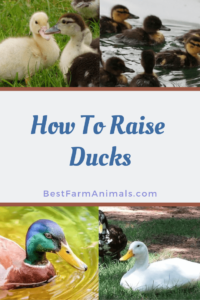
My Preferred Duck Supplies and Equipment
This list contains affiliate products. Affiliate products do not cost more but helps to support BestFarmAnimals and our goal to provide farm animal owners with accurate and helpful information.
Ducks can eat non-medicated chicken food or a specially formulated feed for ducks like this duck starter feed.
Mealworms as a protein treat, are easy to keep on hand. I try always to have some available.
An automatic feeder and waterer keep the mess down. I like this one because ducks can submerge their beaks, which is necessary for healthy eating.
DE or Diatomaceous Earth helps to keep bugs and pests down. I prefer food grade so it doesn’t hurt my ducks.
Niacin Tablets and Brewers Yeast are both very helpful in keeping ducks healthy.

